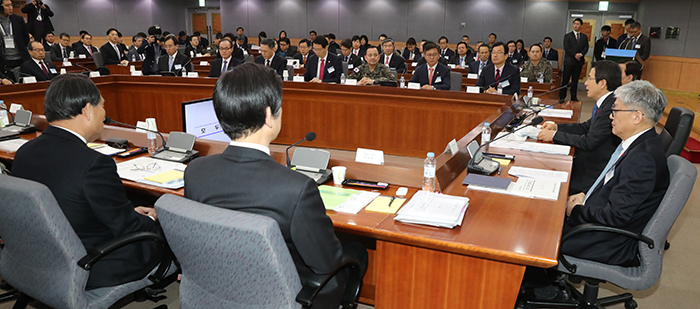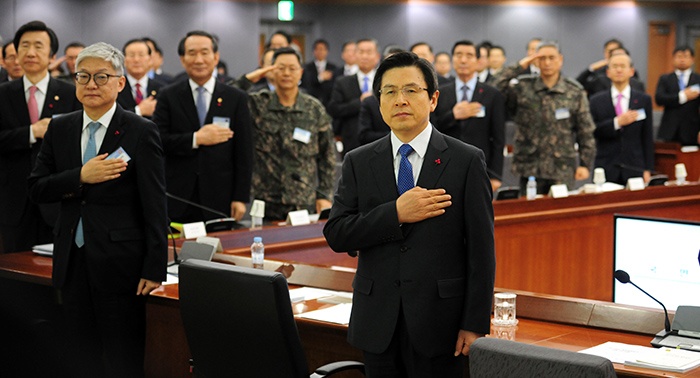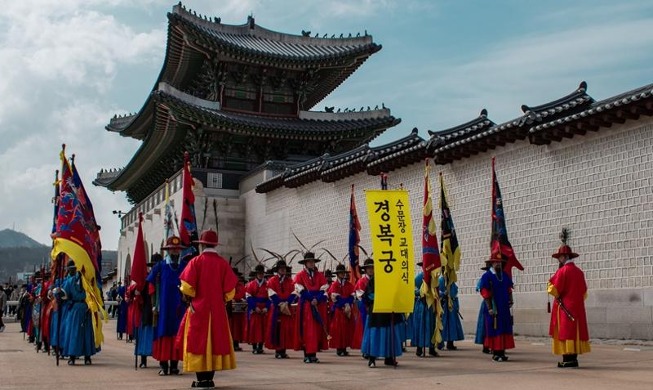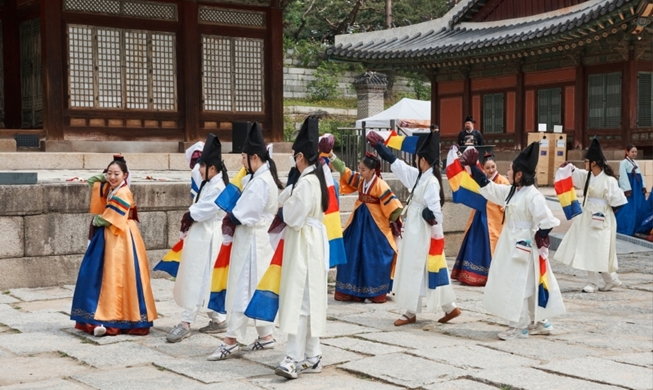-
 Korea.net's 24-hour YouTube channel
Korea.net's 24-hour YouTube channel- NEWS FOCUS
- ABOUT KOREA
- EVENTS
- RESOURCES
- GOVERNMENT
- ABOUT US
The Korean government has outlined a set of policies on security and diplomatic affairs, covering a stronger response to Pyongyang’s provocations and enhancing Korea's alliance with the U.S.
On Jan. 4 during the year's first joint report on foreign and security policies, four government ministries -- the Ministry of National Defense, the Ministry of Foreign Affairs, the Ministry of Unification and the Ministry of Patriots & Veterans Affairs -- outlined their major tasks for 2017 and listed steps to accomplish those goals. Acting President Hwang Kyo-ahn presided over the four-ministry briefing session.

The Ministry of National Defense said that it would pursue a firm defensive posture, with the aim of achieving “defense that's built on a solid foundation; defense that paves the way for a safer future.”
To this end, the ministry stressed that efforts should be made to strengthen the Korea's ability to respond firmly to any of Pyongyang's provocations, to enhance the Seoul-Washington alliance and similar multilateral alliances, and to reform the current defense system to bring it in line with the transforming security environment.
“We pledge our resolute military readiness against North Korea, and we will boost our capabilities to deal with any threat carried out by that regime. We will also solidify our defenses by securing more reserve forces,” said Defense Minister Han Minkoo.
The Ministry of Unification laid out 10 main tasks that it plans to carry out in the new year, with the goal of “denuclearizing North Korea and laying the foundation for peaceful inter-Korean unification.” The ministry will work toward making the North free of nuclear weapons and strengthen its ability to realize a peaceful unification on the peninsula.
Minister of Foreign Affairs Yun Byung-se said, “In the new year of 2017, we face the gravest-ever challenge, in terms of security and diplomatic affairs, ever since the Cold War. We face a North Korea that continues to accelerate its nuclear weapon and missile capabilities.” To overcome these challenges and to turn them into new opportunities, the minister set forth a series of core diplomatic tasks. Among them, the ministry will lead the North down the proper path toward denuclearization by means of stronger resolutions and more pressure. There will also be more efforts to enhance the Korea-U.S. alliance against the North, as well as improvements to trilateral cooperation between Seoul, Beijing and Tokyo. The government will aim to contribute to the United Nation’s three core goals -- global peace & security, human rights and development & climate change -- and will help to establish an environment for amicable diplomacy and a global economy.

Acting President Hwang Kyo-ahn said, “We face more uncertainty and unpredictability than ever this year,” calling on the four ministries to build a thorough security infrastructure. “Losing our security means losing everything,” he concluded.
By Sohn JiAe
Korea.net Staff Writer
Photos: Yonhap News, Office for Government Policy Coordination
jiae5853@korea.kr
On Jan. 4 during the year's first joint report on foreign and security policies, four government ministries -- the Ministry of National Defense, the Ministry of Foreign Affairs, the Ministry of Unification and the Ministry of Patriots & Veterans Affairs -- outlined their major tasks for 2017 and listed steps to accomplish those goals. Acting President Hwang Kyo-ahn presided over the four-ministry briefing session.

The ministries of defense, foreign affairs, unification and veteran affairs give a briefing on their policies for 2017, during a joint report on foreign and security policies for 2017, in Seoul on Jan. 4.
The Ministry of National Defense said that it would pursue a firm defensive posture, with the aim of achieving “defense that's built on a solid foundation; defense that paves the way for a safer future.”
To this end, the ministry stressed that efforts should be made to strengthen the Korea's ability to respond firmly to any of Pyongyang's provocations, to enhance the Seoul-Washington alliance and similar multilateral alliances, and to reform the current defense system to bring it in line with the transforming security environment.
“We pledge our resolute military readiness against North Korea, and we will boost our capabilities to deal with any threat carried out by that regime. We will also solidify our defenses by securing more reserve forces,” said Defense Minister Han Minkoo.
The Ministry of Unification laid out 10 main tasks that it plans to carry out in the new year, with the goal of “denuclearizing North Korea and laying the foundation for peaceful inter-Korean unification.” The ministry will work toward making the North free of nuclear weapons and strengthen its ability to realize a peaceful unification on the peninsula.
Minister of Foreign Affairs Yun Byung-se said, “In the new year of 2017, we face the gravest-ever challenge, in terms of security and diplomatic affairs, ever since the Cold War. We face a North Korea that continues to accelerate its nuclear weapon and missile capabilities.” To overcome these challenges and to turn them into new opportunities, the minister set forth a series of core diplomatic tasks. Among them, the ministry will lead the North down the proper path toward denuclearization by means of stronger resolutions and more pressure. There will also be more efforts to enhance the Korea-U.S. alliance against the North, as well as improvements to trilateral cooperation between Seoul, Beijing and Tokyo. The government will aim to contribute to the United Nation’s three core goals -- global peace & security, human rights and development & climate change -- and will help to establish an environment for amicable diplomacy and a global economy.

Acting President Hwang Kyo-ahn (front) and officials from government ministries involved in the nation’s security and diplomatic affairs salute the national flag during a joint briefing session in Seoul on Jan. 4.
Acting President Hwang Kyo-ahn said, “We face more uncertainty and unpredictability than ever this year,” calling on the four ministries to build a thorough security infrastructure. “Losing our security means losing everything,” he concluded.
By Sohn JiAe
Korea.net Staff Writer
Photos: Yonhap News, Office for Government Policy Coordination
jiae5853@korea.kr













